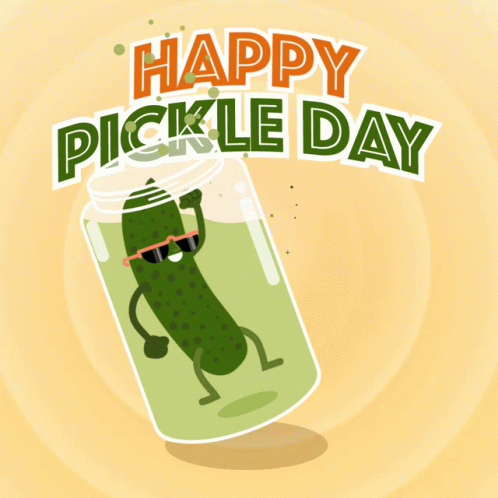National Pickle Day
I love pickles. I love eating pickles; I love drinking pickle juice; I like freezing pickles into picklecicles to enjoy as a frosty treat on a hot summer day; I love making pickles.I cannot impress upon you just how much I love pickles. I have been known to sing and dance about pickles. I, admittedly, favor some pickle flavors over others but each have their place. But for ultimate stand-alone snackage? Gimme that dill, that brined, that Polish, dill gherkin stuff!
Gif of Sesame Street’s Wish Pickle wearing a gold cape, standing in front of a red background, declaring, “I am kind of a big dill.”
So, imagine my utter delight at learning there is a WHOLE DAY celebrating pickles! I am 100% about this.
Gif: a cartoon pickle wearing orange sunglasses dances within a rocking pickle jar full of brine; above are the words, “HAPPY PICKLE DAY.”
The first known National Pickle Day was created in 1949 by the Pickle Packers Association—since renamed to Pickle Packers International—to be a part of International Pickle Week which the Association had established the year before. I’m not entirely sure when National Pickle Day was moved to November—International Pickle Week occurs the third week in May and spans Memorial Day weekend—but you’ll not find me arguing with having additional opportunities to celebrate pickles. (And more reminders to make sure I have all the canning supplies I need!)
If I could turn myself into a pickle I would. But I can’t. And I wouldn’t do it to get out of therapy like some people.
Pickling as a food preparation method is thought to date back to ancient Mesopotamia, though there is some debate about whether those first fruit vegetables to be pickled were cucumbers or snake melons. In either case, the process of pickling foods continued to evolve in and disseminate from the Middle East, becoming a vital means of preserving food for long voyages and “providing families with a source of food during the cold winter months.” The latter became particularly important in eastern European cold-weather countries. Though, certainly not alone among eastern Europeans in the habit of pickling vegetables, Rabbi Gil Marks explained that, over the centuries, Ashkenazim made an annual tradition of filling barrels or crocks with cucumbers, cabbage, or beets, “leaving them in root cellars to provide zest to dining for much of the year”—dining that often consisted of potatoes and black bread.Various pickled and preserved foods came to the United States from all over the world by way of colonization, trade, and immigration. Europeans brought pickled vegetables and meats of all sorts—and their recipes—with them to the “New World” from the beginning of settler colonization and with subsequent waves on immigration. The English brought sweet pickles; eastern Europeans brought sauerkraut; corned beef made its way here from Ireland; escabeche from Spain, Italians brought giardiniera; and so on. Immigrants from east and southeast Asia brought some delicious pickled and preserved treats too: Korean immigrants brought kimchi; huamei or li hing mui (li hing mui translates to “traveling plum”) made its way here from China by way of Hawaii (I know it’s not pickled but it is preserved with extensive salting. And also? It’s delicious); gari from Japan; Vietnamese brought đồ chua… I could go on ad infinitum but the point is to acknowledge how vital pickling and brining have been as a means of preserving food globally. And acknowledge how delicious that vital pickling and brining process to preserve foods from around the world is.Whether its đồ chua on bánh mì or a Kosher dill next to a deli sandwich and all kinds of pickled foods between and beyond, I celebrate pickles of all kinds! (except for pickled eggs and pickled beets and pickled red beet eggs, y’all can keep those. *shudders in traumatic childhood flavor experiences* More for you, am I right?) And pickles should be celebrated—as a means of humans’ continued survival, as a smorgasbord of delightful flavors, and as culinary records of cultures worldwide; after all, as Rabbi Gil Marks also remarked, “to know a community is to know its food.”So, get out there; learn about the communities around you by learning about their foods and culinary history; eat pickles! Happy National Pickle Day, y’all!

